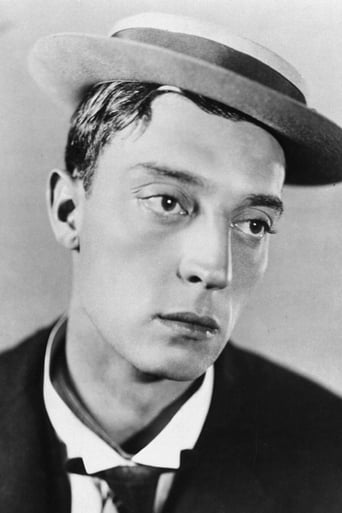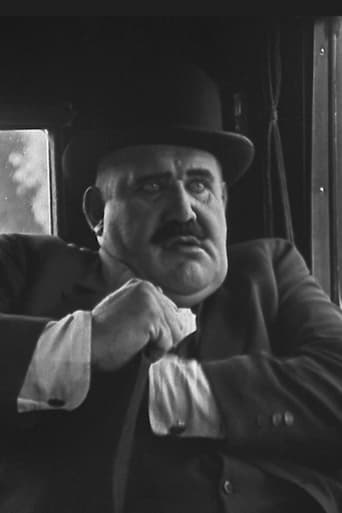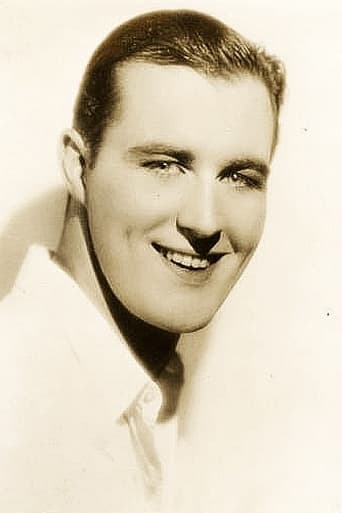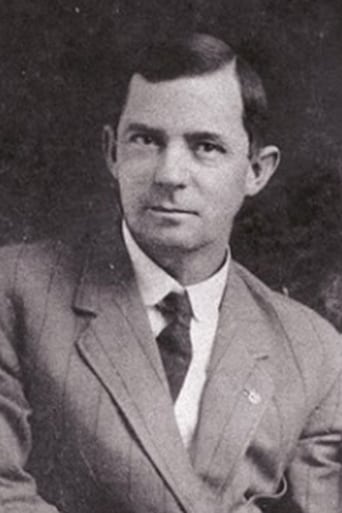Beanbioca
As Good As It Gets
Forumrxes
Yo, there's no way for me to review this film without saying, take your *insert ethnicity + "ass" here* to see this film,like now. You have to see it in order to know what you're really messing with.
Micah Lloyd
Excellent characters with emotional depth. My wife, daughter and granddaughter all enjoyed it...and me, too! Very good movie! You won't be disappointed.
Kaydan Christian
A terrific literary drama and character piece that shows how the process of creating art can be seen differently by those doing it and those looking at it from the outside.
mmallon4
All of Buster Keaton's silent films had a beauty and a grace to them, but Our Hospitality exemplifies this best. A mini epic, full of beautiful, lush scenery and landscape shots; visually speaking, I consider this to be Keaton's best film. Take the film's finale as an example, as Keaton walks along the edge of a cliff with huge forest backdrops stretching as far as the eye can see or the equally as impressive sequence in which an entire dam is blown up. But the sequence which best showcases this idealised look at 1830's America is the supreme majesty of the steam locomotive sequence; a predecessor to what would come in The General. This is one of the greatest sequences Keaton ever captured on film, with the music score on the Thames Silent's version giving it (as well as the film as a whole), an even greater sense of awe. Filming as well the construction of such large scale props must have been no easy feat. It's a sequence which is beautiful, funny and thrilling at the same time, filled with so many inventive sight gags. When Keaton's top hat doesn't fit on his head in the locomotive carriage, he puts on his iconic pork pie hat; that's more like it! It's a bumpy unstable ride to say the least, and even has a dog chasing it throughout for that extra bit of amusement.The set up of Our Hospitality is the type of melodrama which was rife during the silent period (and what Keaton himself parodied in his short The Frozen North). One family has a feud with another which lasts from one generation to the next, and nobody remembers what caused the feud to begin with ("Men of one family grew up killing men of another for no other reason expect their fathers had done so"). Ah simple but effective naivety; why can't we all just get along? Keaton's birth place is not stated during the film, but it's clearly located in Appalachia, prior to his character being sent to New York for a better upbringing; Keaton the sophisticated New Yorker vs. hillbilly red necks. Yep, we have a movie here ripe with hillbilly stereotypes. On top of tapping into the Appalachian cultural stereotype of feuding families, there are plenty of guns stored in the Canfield house, but when they're not allowed to use them due to their comical dedication to be hospitable, they just ask the townspeople to borrow a gun. Likewise in another scene Keaton sees a husband abusing his wife, steps in and throws the husband aside, yet the wife starts attacking Keaton himself. Keaton then runs away, followed by the husband ordering the wife back into the house. Ah the glorious lack of political correctness.
braddugg
One of the best trips and one of the earliest trips too in the most funniest vehicles.Oh yes, this my most recent film and the second earliest film, I have seen (earliest being 1921 Charlie Chaplin's 'The Kid'). It has a whole range of vehicles from a cart, a cycle, a train, a donkey and a glimpse of Rocket prototype, all are too very funny to notice and our hero John Mckay (Buster Keaton) is even funnier. He is the shortest male character who runs and runs from the villains. This is not contemporary 1923 film but is set in 1830's and that in itself brought out a humorous production design and art director must have been laughing when did a cycle or a train design.Everything is out and out funny and the moments just keep coming. His genius is written in most of scenes if not all. When villains are searching for him, a waterfall saves him wow, can something be more creative than that to cover him. Buster Keaton has an originality that is very pristine that even Chaplin and Welles adored him for the way he carried out a film. That is very well shown in this film, selecting the time period make things look funny intentionally and the characters are so very stereotypical, we will not have sympathy but we will have a word that says, "let him have it". The one scene rather frame in which he expresses love to the heroine is enough to know how funny he was. Keaton stunts, I must mention are tough for in those days there was noting at hand except physical body which took a lot of strain and he did them all effortlessly (at least that is how it seems) and with a lot of courage, kudos to him in all terms. This film was remade as "Maryada Ramanna" in telugu which was a very disappointing and serious take for a film that is extremely funny.All salutations to Buster Keaton.For this, it's 4/5. Please watch if you haven't coz it may be the funniest trips you have ever done on screen.Oh no, there is "THE GENERAL" for me which I will review later.
Bill Slocum
"Our Hospitality" isn't Buster Keaton's greatest film, but shows a young pioneer on his way.As Willie McKay, Buster inherits a family estate down South circa 1830. To stake his claim, Willie must survive two things: 1. A ride on the "iron monster" which chugs ungently across hilly terrain. 2. The "hospitality" of the rival Canfield clan who wants to send an unwary Willie to the boneyard with the rest of the McKays.Watching Buster riding a train down South immediately conjures up thoughts of his later "The General," and there are plenty of other signposts for Buster fans. After finding himself unable to wear his foppish top hat in a coach with a low ceiling, Buster shifts to more practical headgear: his trademark porkpie, which remains with him thereafter. He's even joined this one time by his real-life wife Natalie Talmadge, who plays a young woman smitten with Willie to both their perils.I was prepared to not like Talmadge, as she didn't have much of a career in movies other than making misery of Buster's private and professional life later on. But she's quite affecting here. Keaton and co-director Joseph Blystone do a lot to draw out a naturally reticent quality in Talmadge; she and Buster work well together…at least here.The opening section features a very serious, overplayed dramatic "prologue" that isn't really needed and puts things on the wrong footing tone-wise. Buster gets a lot of mileage from his clattering train prop, but overuses the same gags. A big stunt at the end involving a waterfall, while jawdropping, lacks the comic underpinnings typically found with Keaton. It could be something out of "Perils Of Pauline."Most critically, the pacing is off. There are many good gags and funny bits of business, but the set-ups take too long. I'm still amused watching the third straight slow-loading flintlock gag in as many minutes, and that's something, but you so often get more from Buster.Keaton's genius shines through in many places, though, particularly at the Canfield house where he is the unwelcome guest of his would-be killers. They operate under a strict code of honor that won't let them shoot a guest (though the same code apparently says nothing about shooting an unwary victim in the back). Watching Willie work every angle he can think of to stay a guest is Keaton in prime form, whether presenting a series of really bad dog tricks or dressing as a woman.And there are some stunts as funny as they are awesome, like one where Willie is actually "rescued" by one of the Canfields on a steep cliff, and the two men wind up tied to one another as killer and prey. The period comedy is good, too; like an early shot of Broadway and 42nd Street in Manhattan's cowtown days, when Willie sits a bicycle watching a lone wagon pass by: "This is getting' to be a dangerous crossin'!"There's enough of that to make "Our Hospitality" good fun, and the stunt work, however off tonally, remains amazing even today. If it's not as great as other Buster comedies, it's Buster's own fault for making his later work so much better than this.
theowinthrop
Not quite up there with THE GENERAL, THE NAVIGATOR, SHERLOCK JR. and STEAMBOAT BILL, JR., OUR HOSPITALITY gives us encouraging signs of Keaton as film creator and thinker. He had done historical films before it - the film just before this was the amusing THE THREE AGES, which was somewhat influenced by the structure of INTOLERANCE (not quite: the stories are parallel here like in INTOLERANCE, but Griffith blended the conclusions to show the results of intolerance are always evil, whereas Keaton has each story end separately). Griffith is an influence here to, in the matter of trying to impose historical correctness of detail. The result is Keaton spoofing it: showing Broadway and 42nd Street in 1830 based on an actual lithograph of the time, which shows that modern thoroughfare as barely out of the cow pasture age - even the cop stops a "traffic jam" by halting foppish Willie McKay on his early bone-shaker bicycle while a wagon has the right of way!*(*Keaton continues this later on in a throw away line, to spoof the cautions of an earlier age. Before he boards the train to take him south, he is warned by his mother, "Be careful of those Indians in Delaware!")All great comedy skirts the edge of tragedy. STEAMBOAT BILL, JR. is resolved when a tornado hits the southern town it is set in, wrecks most of it, and sinks Mr. King's modern steamboat. The reason the ship in THE NAVIGATOR is set adrift is due to foreign agents of one of two countries currently at war. Keaton is fully aware of how close tragedy and comedy touch each other. In Our HOSPITALITY he has a ten minute prologue which could have been in a drama: Willie McKay's dad (when Willie was an infant in the south) has been insulted by the younger brother of Joseph Canfield (Joe Roberts) a neighbor. Apparently the insult was a mutual one. Despite the entreaties of his wife Mr. McKay goes out of his home armed. Canfield, likewise, tries to prevent his brother, but fails. We watch as both men basically spot each other in the dark, approach with care and fire - mortally wounding each other. Canfield dies on the spot, but Mr. McKay stumbles back to his home and dies. Joseph Canfield looks at the dead body of his brother and realizes that this begins the real matter of a blood feud. He regrets it, but hardens himself to prepare for a massacre. Mrs. McKay quickly leaves the house with baby Willie, fleeing town and heading North.It sets the stage (though a logic question is dropped - given the threat to McKays in the southern town, why is Willie allowed to go back to claim his inheritance?) Willie heads south on the newly built railroad, which has wooden tracks that keep needing repairs (at one point the train accidentally goes off the rails and continues puffing along like a set of coaches pulled by a steam powered automobile). The train contains more than Willie - he has met a charming southern girl (Nathalie Talmadge - in actual life Buster's wife), who happens to be the only daughter of Joe Canfield. He arrives with an invitation from her to her home for dinner. He plans to do that, and goes to see his great estate (which turns out to be a little log cabin), and then heads for the dinner invitation. In the meantime word has spread to the Canfields that the last McKay is in town. They are planning on killing Willie when (to their general consternation and surprise) he shows up for dinner.What follows is how Keaton twists southern hospitality into a pretzel as Joe Canfield and his two sons keep an eye on Willie in the hope that he leaves the house long enough to be shot. At first Willie is unaware of all this, but gradually he realizes what is going on, and he is as determined to stay inside their home as long as possible. This delights Virginia Canfield (Talmadge) until she realizes the danger she has put Willie into. Soon she's trying to figure out how to prolong this visit beyond the conclusion of dinner.Eventually it is impossible to maintain the strained bond of hospitality. Willie flees into the forest, pursued by vengeful Canfields. The tricks here include a memorable demonstration on the dangers of the law gravity involving Willie and one of his pursuers and a ledge overlooking a waterfall. The waterfall also turned out to be nearly fatal - Keaton took a serious fall in the shooting, and did not realize for several years that he had broken his neck (and survived). Another unconscious serious element is Joe Roberts - he had suffered a stroke during the filming, and insisted on continuing his scenes when he "recovered". There are scenes where he is seen wandering in the forest, but acting really lost - like he can't tell what is going on around him. Roberts (an old family friend of Buster's) died later in 1923, OUR HOSPITALITY being the last film he made with Keaton.Despite the downer of Roberts' illness and Keaton's close call, the film works well, and remains consistently funny. As a second level Keaton film it is a good introduction to his work. As an intriguing look at Keaton's fascination with trains, it is a fine introduction to his masterpiece THE GENERAL.








